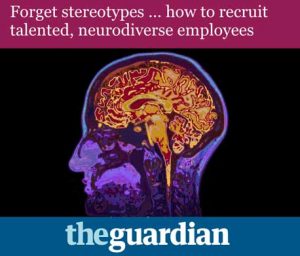Thursday 31 August 2017
James Neely used to work in an open-plan office. His journey to work included busy, stressful train journeys. “I tended to isolate myself from people, so I had my headphones on and turned up all day and I wore a cap to limit my peripheral vision and reduce the light,” he says.
However, the 33-year-old data analyst struggled to find the quiet he needed at work. Eventually he had a breakdown. During subsequent treatment for anxiety and depression he was diagnosed with an autistic spectrum condition.
Neely now works for Auticon, a company that employs 15 full time IT consultants who have autism. They work on projects at major companies in the UK, including Experian and GlaxoSmithKline. Neely’s found comfort in his new role. “We have back-office support from project managers and job coaches,” he says. This takes off some of the pressure if a difficult situation arises.
The job coaches encourage Auticon’s consultants to take regular time off, which, Neely says, helps to “avoid the build up of anxiety or sensory overload”. They also assist them with prioritising tasks and ensure the workplace environment is comfortable.
In the UK, just 16% of autistic adults are in full time employment, according to the National Autistic Society. And yet research has shown autistic traits can be associated with high numbers of unusual responses on divergent thinking tasks; a mark of creativity, which is sought after by ambitious startups. Meanwhile, research from University of Montreal suggests that people with autism are up to 40% better at problem solving.
Ray Coyle, Auticon’s CEO, says there’s a strong business case for employing neurodiverse people. One of Auticon’s clients, Siemens, say the two Auticon consultants who were working for them increased the team’s product testing efficiency by 50% within their first week.
Coyle adds: “The fact that Auticon is profitable [revenues have grown by around 50% each year since 2014] shows that our business model is sound and reflects the quality of our workforce.”
Dr Linda Buchan is director of Cheshire-based Axia-ASD Ltd, which offers assessment services, including for autism spectrum disorders. She says while running a small business with neurodiverse staff can bring particular challenges, the benefits are clear. Buchan has dyspraxia. She says many people assume dyspraxia just affects coordination, but it goes much further. “Dyspraxia can affect any muscle groupings in the body, it can affect your sense of time, distance and visual tracking too.”
CONTINUE READING…Share This Post:









It would be great to also get some seniors in on this too. Perhaps it is an idea that I can work on myself. I already have some adult coders I can call on, for example. I’m not in the UK either, but a lot of stuff can surely just be done online these days, without any physical presence. Something I have already done a few times. 🙂
#RightBrainDominance
So what I struggle with is this: I think in videos.
I am rather right brain dominant.
When I TRY to express myself, I use metaphors, analogies, scenes from movies, book quotes, youtube videos, or I make memes myself… whatever I can find to GIVE ME THE WORDS that match the image I have in my minds eye, so I can explain and express myself to others.
But so often I feel misunderstood. I can’t seem to get my point across. And it drives me nuts.
I only feel connection, when I feel heard and understood.
Feeling misunderstood and judged is crushing.
You get lost in Translation…
This can be difficult to express your needs at work.
Already at school I struggled with that. I did not fit the mold.
I did not understand my own needs, so I also did not chose the right profession that would have suited my skills.
And then of course performance will suffer.
Anxiety and stress will build up.
When you feel people don’t “get you” you don^t feel safe.
It makes you sad.
You think, it’s all your fault, so you implode.
It’s soul crushing.
Because as much as you voice your needs, you don’t get through.